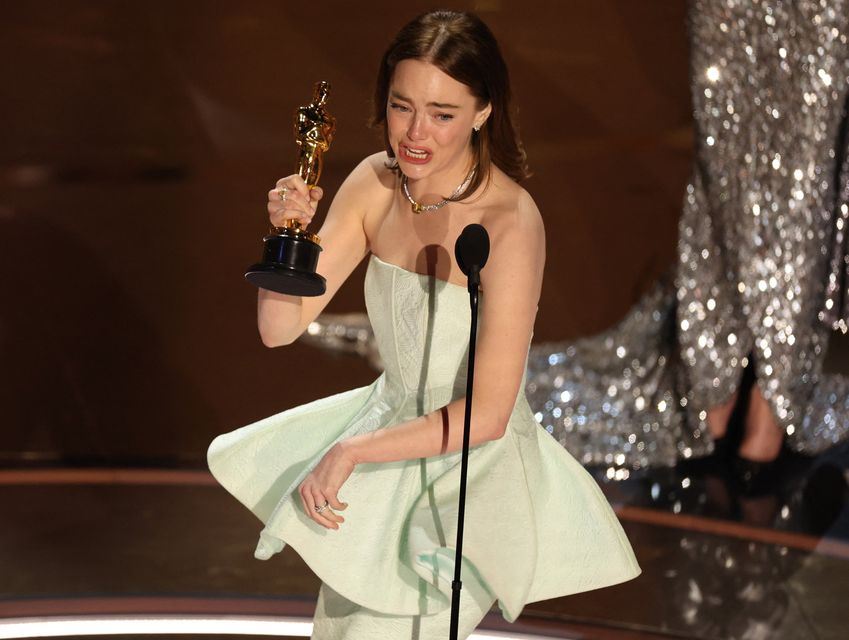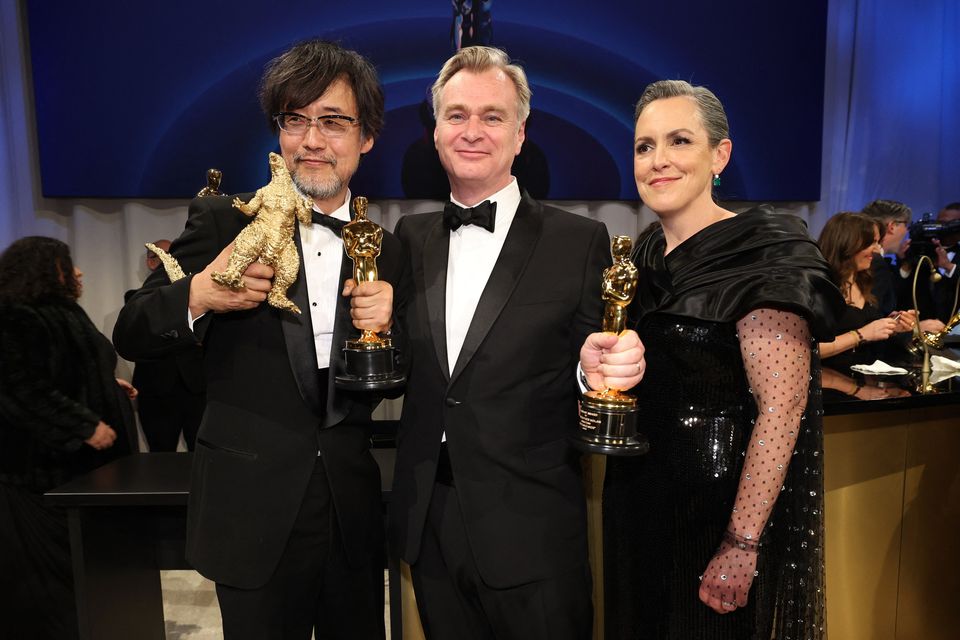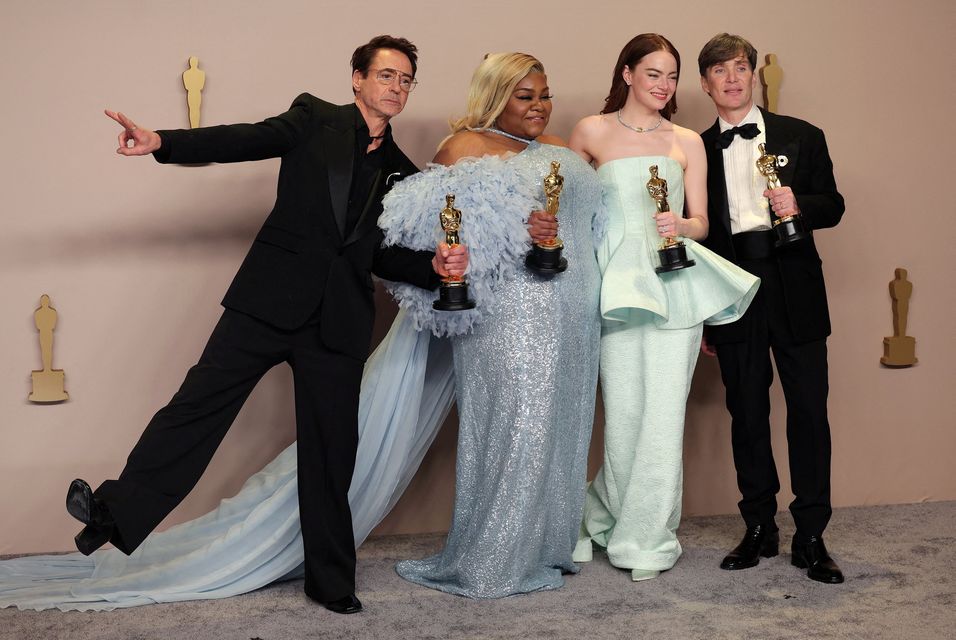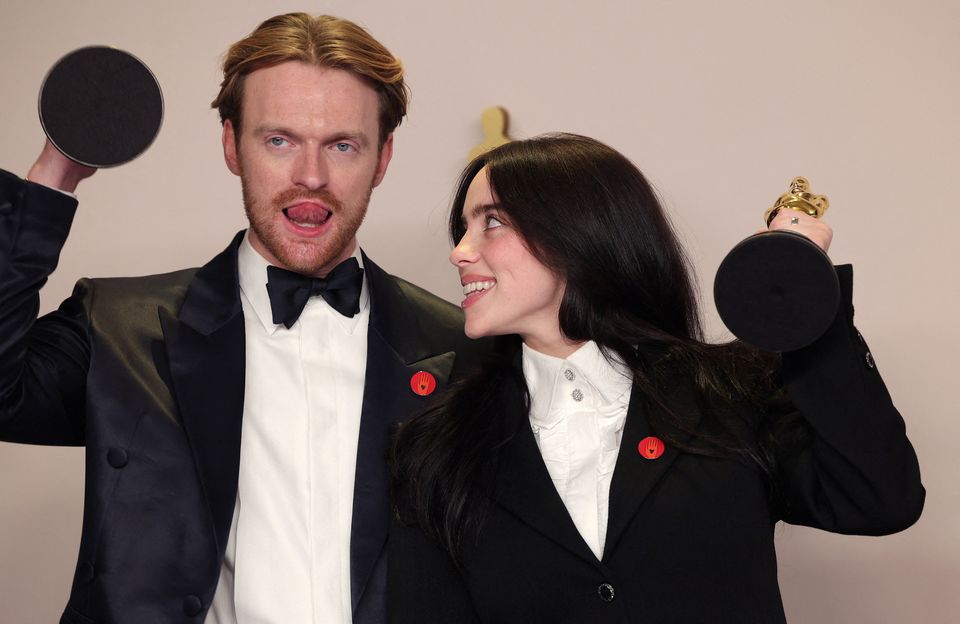Christopher Nolan’s drama takes seven awards from 13 nominations, including best picture and director, as well as best supporting actor for Robert Downey Jr Ukraine wins first ever Oscar with ‘20 Days in Mariupol’ as best documentarySlash joins Ryan Gosling on stage for performance of ‘Barbie’ hit ‘I’m Just Ken’
Christopher Nolan also won the award for director, while Robert Downey Jr won best supporting actor for Oppenheimer, which also took the prize for best picture, among its haul of seven awards out of a total of 13 nominations.
Cork native Murphy, who played physicist J. Robert Oppenheimer as he led the race to build the first atomic bomb, was considered the favourite for best actor and on Sunday night in LA his dreams came true.
Cork reacts to Cillian Murphy’s Oscar win
Cillian Murphy reacts as “Oppenheimer” wins the Oscar for Best Picture during the Oscars show at the 96th Academy Awards in Hollywood, Los Angeles, California, U.S., March 10, 2024. REUTERS/Mike Blake
In his speech after receiving his statuette, Murphy thanked Nolan, the film’s crew and co-stars and the other nominees.
“I’m a little bit overwhelmed,” he said.
He also thanked his parents Brendan and Mary and his wife, Yvonne McGuinness, “my partner in life and art”, and “my two boys, Malachy and Aran, who are sitting up there – I love you so much.”
Murphy said: “I’m a very, very proud Irish man standing here tonight.
“We made a film about the man who created the atomic bomb, and for better or worse we’re all living in Oppenheimer’s world, so I would really like to dedicate this to the peacemakers everywhere.
“Go raibh míle maith agaibh.”
Cillian Murphy says he is ‘proud to be Irish’ after best actor award win
Murphy beat Colman Domingo for Rustin, Bradley Cooper for Maestro, Paul Giamatti for The Holdovers, and Jeffrey Wright for American Fiction.
Reacting today, the principal of Murphy’s old secondary school said he “absolutely” expects students to be inspired by the Cork man’s Oscar win, while students at his former primary school were brimming with questions about their famous past pupil.
Presentation Brothers Cork principal David Barry said everyone there is thrilled for their former student.
“Presentation Brothers College are delighted for Cillian and his family on his success in winning the Oscar. We’re so proud to have one of our past pupils so successful on the world stage,” said Mr Barry.
“The whole community is delighted and we want to congratulate Cillian on his fantastic success. Hopefully when he’s back in Cork he might be able to visit us.
“I suppose from his speech last night you can see that he was very supportive of everyone who helped him in his journey to winning the Oscar. He’s very clear and grounded in where he’s from as well – that comes from his own family background where he had supportive parents and a supportive family now.
“Your roots are really important and Cillian has worked abroad so often, but really never forgets his roots and visits his parents regularly.
“Because he has such a busy schedule, getting back to Ireland and Cork brings him back to who he is really.”
Asked whether students would be inspired by his win, Mr Barry said: “Oh absolutely.
“The students here have always been big fans of him, even before Oppenheimer.
“We’ve a big piece of artwork from our senior arts students – we did a collage made out of aluminium tins in the character of Tommy Shelby (Murphy’s character in the hit TV show Peaky Blinders) and that’s up in the school corridor.
“He’s always about for us really in our thoughts as the kids walk through the corridors every day.
“If you put in the efforts you will get the rewards eventually, no matter what field you’re in.”
Cork lord mayor Kieran McCarthy said the county was very proud of their local man’s success.
Asked how they will hold a big celebration for a normal man, he said that’s the question they have been asking themselves: “Even I, as lord mayor of Cork, don’t know how we’re going to approach that.”
Meanwhile, the atmosphere at Murphy’s old primary school was palpable this morning.
Sean Lyons, principal of St Anthony’s National School in Ballinlough, said that some of the younger students had arrived at school asking questions about Murphy and the Oscars.
He said the students were asking: “Mr Lyons, did you know that Cillian won the Oscar for best actor?’ ‘Did I sit in Cillian’s seat?’ ‘ Did he walk through this door?’ – there was just a real awe and a real celebration.
“Just to see him receive the Oscar, to be so humble, so respectful and so grounded at the highest point of his career was the testament to a remarkable role model for everyone,” Mr Lyons told RTÉ Radio.
Mr Lyons, who spent a year as Murphy’s classmate, described him as “good humoured”, a fluent Irish speaker and “a very good illustrator” and Scrabble player.
Irish politicians and creatives also lined up to congratulate Murphy on his Oscar win.
A post from the President of Ireland’s account on X said it was a “wonderful achievement” and the win was “so appropriately dedicated” to the peacemakers.
Tánaiste Micheál Martin said his fellow Cork man gave an “outstanding” performance in a film “that will stand the test of time”.
“At Lee side in Cork, (we’re) delighted for him and for his wonderful family – the nation rejoices in a well-deserved Oscar award for Cillian Murphy.”
Culture Minister Catherine Martin said the award was “a fitting recognition” of Murphy’s “immense” talent.
She also congratulated the cast and crew of Poor Things, co-produced by Dublin-based Element Pictures, which secured 11 Oscar nominations and won four awards.
The minister said 2023 “was a hugely successful year for Irish film production and Irish talent”, adding: “I hope this Academy Award is a starting point for more success and acclaim for the large pool of talent existing in the Irish film industry.”
Murphy follows in the footsteps of other great Irish actors to be honoured by the Academy.
In 1990, Brenda Fricker won best supporting actress for her role in My Left Foot, for which another Irish actor, Daniel Day-Lewis, won best actor. Day-Lewis went on to win two more Oscars, in 2007 for There Will Be Blood, and in 2012 for Lincoln, making him the only actor to win three best actor Oscars.
Murphy’s main competition, according to awards pundits, had been The Holdovers star Giamatti.
Oppenheimer star Robert Downey Jr, who played the scientist’s professional nemesis, took home his first Oscar for best supporting actor.
Emma Stone accepts the Oscar for Best Actress for “Poor Things” during the Oscars show at the 96th Academy Awards in Hollywood, Los Angeles, California, U.S., March 10, 2024. REUTERS/Mike Blake
The three-hour drama also won Oscars for best film editing and best cinematography. It led the field with 13 nominations ahead of the awards.
Nolan narrowly missed out on the award for best adapted screenplay, which went to Cord Jefferson’s American Fiction.
Christopher Nolan and Emma Thomas, winners of the Oscar for Best Picture for “Oppenheimer”, pose with Takashi Yamazaki, winner of the Oscar for Best Visual Effects for “Godzilla Minus One”, at the Governors Ball following the Oscars show at the 96th Academy Awards in Hollywood, Los Angeles, California, U.S., March 10, 2024.
In anointing Oppenheimer, the Academy of Motion Pictures Arts did something it hasn’t done for more than a decade: hand its top prize to a widely seen, big-budget studio film. In a film industry where a cape, dinosaur or Tom Cruise has often been a requirement for such box office, Oppenheimer brought droves of moviegoers to theatres with a complex, fission-filled drama about the creation of the atomic bomb.
The Oscars showdown between Oppenheimer and Barbie – dubbed ‘Barbenheimer’ as cinemagoers flocked to see both last summer – never quite materialised, and Barbie came away with just one award, for best song for Billie Eilish’s What Am I Made For.
As a film heavy with unease for human capacity for mass destruction, Oppenheimer also emerged – even over its partner in cultural phenomenon, Barbie – as a fittingly foreboding film for times rife with cataclysm, man-made or not. Sunday’s Oscars at the Dolby Theatre in Los Angeles unfolded against the backdrop of wars in Gaza and Ukraine, and with a potentially momentous US election on the horizon.
Cillian Murphy, winner of the Best Actor Oscar for “Oppenheimer”, joins Emma Stone, winner of the Best Actress Oscar for “Poor Things”, Da’Vine Joy Randolph, Best Supporting Actress Oscar winner for “The Holdovers”, and Robert Downey Jr., Best Supporting Actor Oscar winner for “Oppenheimer”, in the Oscars photo room at the 96th Academy Awards in Hollywood, Los Angeles, California, U.S., March 10, 2024. REUTERS/Carlos Barria
The most closely watched contest of the Academy Awards went to Emma Stone, who won best actress for her performance as Bella Baxter in Poor Things.
The film is another win on an incredible night for Ireland as it was produced by Dublin-based Element Pictures.
In what was seen as the night’s most nail-biting category, Stone won over Lily Gladstone of Killers of the Flower Moon. Gladstone would have become the first Native American to win an Academy Award.
Instead, Oscar voters couldn’t resist the full-bodied extremes of Stone’s Poor Things performance. The win for Stone, her second best actress Oscar following her 2019 win for La La Land, confirmed the 35-year-old as arguably the preeminent big-screen actress of her generation. The list of women to win best actress two or more times is illustrious, including Katherine Hepburn, Frances McDormand, Ingrid Bergman and Bette Davis.
“Oh, boy, this is really overwhelming,” said Stone.
Nolan has had many movies in the Oscar mix before, including Inception, Dunkirk and The Dark Knight. But his win on Sunday for direction is the first Academy Award for the 53-year-old filmmaker.
In his acceptance speech, Nolan noted cinema is just over a hundred years old.
“We don’t know where this incredible journey is going from here,” said Nolan. “But to think that I’m a meaningful part of it means the world to me.”
Demonstrations for Gaza raged outside the Dolby Theatre on Sunday evening.
The Zone of Interest director Jonathan Glazer condemned the ongoing attacks on the Gaza Strip by Israel as he accepted an Oscar for his film about the banality of evil during the Holocaust. It won the best international feature Oscar for the United Kingdom.
Accepting the award, Glazer’s hands appeared to tremble as he read a pre-written speech, saying: “All of our choices were made to confront us in the present. Not to say ‘Look what they did then, rather look what we do now’.
“Our film shows where dehumanisation leads at its worst – it has shaped all of our past and present.
“Right now we stand here as men who refute their Jewishness and the Holocaust being hijacked by an occupation which has led to conflict for so many innocent people.
“Whether it’s the victims of October 7 in Israel or the ongoing attack on Gaza, all are victims of this dehumanisation. How do we resist?”
He was met with applause before he continued: “Alexandria… the girl who glows in the film, as she did in life, chose to. I dedicate this to her memory and to her resistance.”
Sunday’s broadcast, hosted by Jimmy Kimmel, had plenty of razzle dazzle, including a sprawling song-and-dance rendition of the Barbie hit I’m Just Ken by Ryan Gosling, with an assist on guitar by Slash. A sea of Kens swarmed the stage.
Oscars 2024: Red carpet fashion highlights
Downey Jr, nominated twice before (for Chaplin and Tropic Thunder), notched his first Oscar, crowning the illustrious second act of his up-and-down career.
“I’d like to thank my terrible childhood and the academy, in that order,” said Downey, the son of filmmaker Robert Downey Sr.
But after an awards season that stayed largely inside a Hollywood bubble, geopolitics played a prominent role. Protests over Israel’s war in Gaza snarled traffic around the Dolby Theatre in Los Angeles, slowing stars’ arrival on the red carpet and turning the Oscar spotlight toward the ongoing conflict. Some protesters shouted “Shame!” at those trying to reach the awards.
Some attendees, including Eilish, wore red pins in a call for a ceasefire in Gaza.
Billie Eilish and Finneas O’Connell pose with the Oscar for Best Original Song for “What Was I Made For?” from “Barbie” in the Oscars photo room at the 96th Academy Awards in Hollywood, Los Angeles, California, U.S., March 10, 2024. REUTERS/Carlos Barria
The war in Gaza was on the minds of many attendees, as was the war in Ukraine. A year after Navalny won the same award, Mstyslav Chernov’s 20 Days in Mariupol, a harrowing chronicle of the early days of Russia’s invasion of Ukraine, won best documentary. The win, a first for The Associated Press and PBS’ “Frontline,” came as the war in Ukraine passed the two-year mark with no signs of abating.
Mstyslav Chernov, the Ukrainian filmmaker and AP journalist whose hometown was bombed the day he learned of his Oscar nomination, spoke forcefully about Russia’s invasion.
“This is the first Oscar in Ukrainian history,” said Chernov. “And I’m honoured. Probably I will be the first director on this stage to say I wish I’d never made this film. I wish to be able to exchange this (for) Russia never attacking Ukraine.”
In the early going, Yorgos Lanthimos’ Frankenstein-riff Poor Things ran away with three prizes for its sumptuous craft, including awards for production design, makeup and hairstyling and costume design, followed by Stone’s best actress gong.
Kimmel, hosting the ABC telecast for the fourth time, opened the awards with a monologue that drew a few cold looks (from Downey, Sandra Hüller and Messi, the dog from best-picture nominee Anatomy of a Fall). But Kimmel, emphasising Hollywood as “a union town” following 2023’s actor and writer strikes, drew a standing ovation for bringing out teamsters and behind-the-scenes workers — who are now entering their own labour negotiations.
Oscars 2024: Eugene Masterson takes a look behind the scenes
The night’s first award was one of its most predictable: Da’Vine Joy Randolph for best supporting actress, for her performance in Alexander Payne’s The Holdovers. An emotional Randolph was accompanied to the stage by her co-star Giamatti.
“For so long I’ve always wanted to be different,” said Randolph. “And now I realise I just need to be myself.”
Though Randolph’s win was widely expected, an upset quickly followed. Hayao Miyazaki’s The Boy and the Heron won for best animated feature, a surprise over the slightly favoured Spider-Man: Across the Spider-Verse. Miyazaki, the 83-year-old Japanese anime master who came out of retirement to make The Boy and the Heron, didn’t attend the ceremony. He also didn’t attend the 2003 Oscars when his Spirited Away won the same award.
Best original screenplay went to Anatomy of a Fall, which, like Barbie, was penned by a couple: director Justine Triet and Arthur Harari. “This will help me through my midlife crisis, I think,” said Triet.
Oscar drama: The scandals, snubs and controversies that shook Hollywood
The Oscars belonged largely to theatrical-first films. Though it came into the awards with 19 nominations, Netflix was a bit player. Its lone win came for live action short: Wes Anderson’s The Wonderful Story of Henry Sugar, based on the story by Roald Dahl.
Historically, having big movies in the mix for the Oscars’ top awards has been good for broadcast ratings. The Academy Awards’ largest audience ever came when James Cameron’s Titanic swept the 1998 Oscars.
Last year’s ceremony, where a very different best-picture contender in Everything Everywhere All at Once triumphed, was watched by 18.7 million people, up 12pc from the year prior. ABC and the academy are hoping to continue the upward trend after a nadir in 2021, when 9.85 million watched a pandemic-diminished telecast relocated to Los Angeles’ Union Station.





